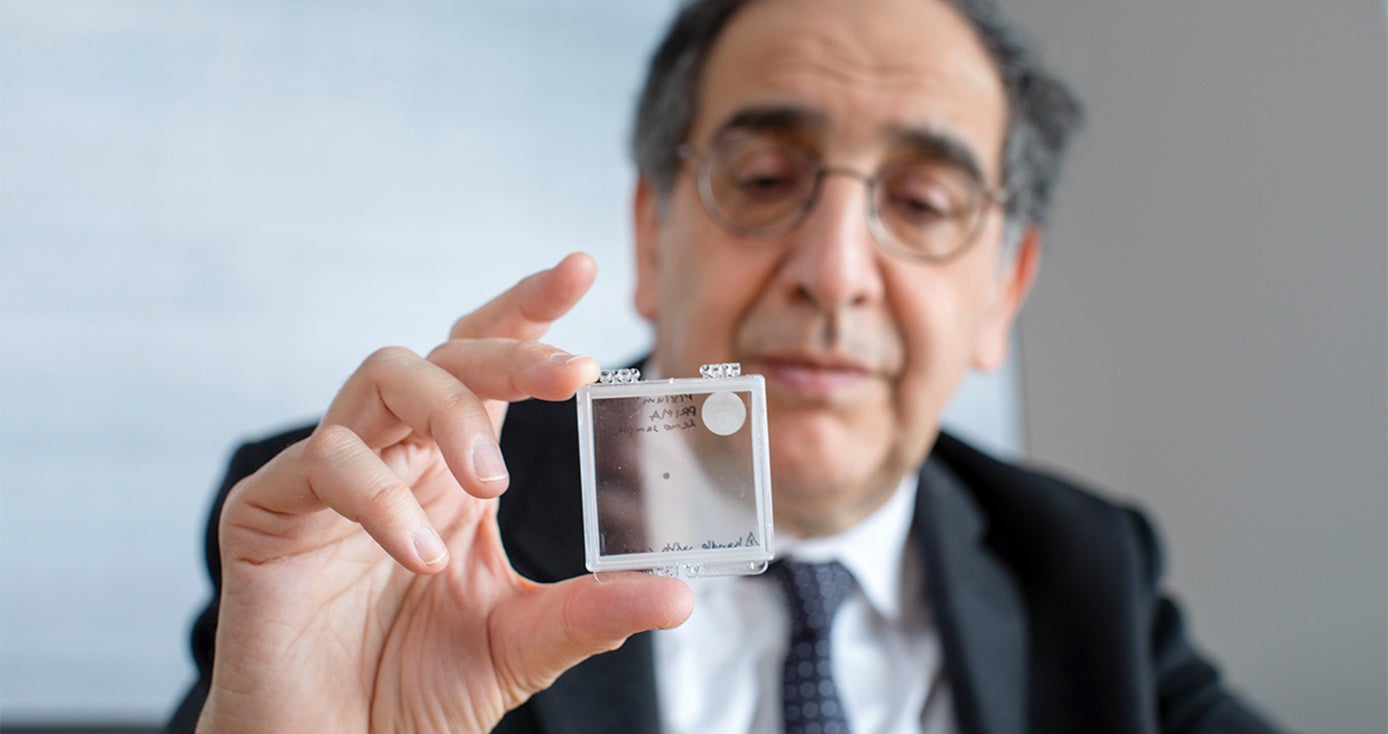
Subscribe to Pittwire Today
Get the most interesting and important stories from the University of Pittsburgh.FDA and Pitt Announce Collaboration to Research and Develop Innovative Therapies to Help Restore Vision
The University of Pittsburgh today announced a collaboration with the U.S. Food and Drug Administration’s Center for Devices and Radiological Health to help address the needs of the visually impaired through the expertise, facilities and research of the world-class School of Medicine’s Department of Ophthalmology.
Under the agreement, Pitt and the FDA will work together for the next five years on scientific collaborations, educational initiatives and outreach activities designed to address the epidemic of vision loss. As the world’s population continues to grow and age, the number of individuals with visual impairments is expected to triple by the year 2050.
“It’s really exciting to see this happening. This will put Pitt in a position where we can work with the FDA on the validation of new technological approaches by developing programs and protocols,” said José-Alain Sahel, Pitt’s Eye and Ear Foundation Endowed Chair of the Department of Ophthalmology and one of the world’s top experts in retinal diseases and vision restoration research. “There is strong expertise at Pitt that is being recognized at an international level. Patients’ voices will nurture our projects and define the successes we all want to deliver.”
“We appreciate this phenomenal opportunity to partner with the University of Pittsburgh. Developing new methods to assess visual impairment and the impact on daily activities is important to helping the FDA better characterize the consequences of vision loss, and also helping FDA to reliably assess the benefit of novel therapies and rehabilitation technologies,” said Malvina Eydelman, director of the Office of Ophthalmic, Anesthesia, Respiratory, ENT and Dental Devices in the FDA’s Center for Devices and Radiological Health.
Research, facilities, expertise
This agreement allows collaboration on a variety of programs covering shared interests in ophthalmology including collaborative research, public outreach, extension activities, cooperative international initiatives, disciplinary training and exchange of scientists and staff, including sabbaticals, postdoctoral fellowships and student internships.
It forms the basis for development of scientific collaborations, outreach and educational initiatives between FDA and the University of Pittsburgh.
Sahel said Pitt’s expertise combined with the FDA’s regulatory and scientific expertise is intended to allow for research such as augmented reality headsets or brain stimulation to help people with low vision “see” their surrounding environments better can be made available sooner.
Pitt’s Department of Ophthalmology is currently developing numerous innovative programs to restore vision or address the needs of the visually impaired: cell therapies, gene therapies, optogenetics, advanced high-resolution imaging, optic nerve regeneration, prosthetic vision and brain stimulation to restore sight, to name a few. Partnerships with other departments such as the Institute of Rehabilitation at UPMC and the Department of Occupational Therapy at the School of Health and Rehabilitation Sciences provide a strong environment enabling a holistic approach to patients’ needs.
The UPMC Vision and Rehabilitation Tower at UPMC Mercy, expected to be completed in 2022, will provide advanced specialty clinical care and innovative programs for visually impaired patients. Based in Pittsburgh, it also will be the home for the vision research program at Pitt and UPMC.
As founder and director of the Vision Institute in Paris, Sahel created StreetLab, a not-for-profit naturalistic platform focused on developing and evaluating new products to help people with visual impairments. His team of experts is focused on all the fields where autonomy and accessibility for visually impaired people require improvement: housing, mobility, access to services and work environment, as well as the assessment of the impact innovative therapies and technologies in daily activities. Sahel is Pitt’s liaison officer in this agreement.
Read more about Pitt research on eye health, including projects being led by José-Alain Sahel.
Gene Therapy Injection in One Eye Surprises Scientists By Improving Vision in Both
Sahel collaborated with researchers at the University of Cambridge to successfully treat 37 patients suffering from Leber hereditary optic neuropathy. Subject to further trials, the treatment could help thousands of people across the world to regain and retain some of their sight.
UPMC First in the U.S. to Implant Wireless Retinal Device for Advanced Age-Related Macular Degeneration
UPMC implanted the first patient in the United States with a new wireless retinal device as part of a clinical trial aimed at restoring partial sight to patients with advanced age-related macular degeneration, a disease that leads to permanent blindness. Sahel initiated the trial.
Into a World of Light
Sahel devotes his considerable intellectual energy to attempting to change the fate of people affected by blindness. He has overseen the creation of a multitude of promising experimental approaches, and now the scientific luminary is Pitt’s chair of ophthalmology.
The Forest, the Trees, and the Leaves
Associate Professor of Ophthalmology and Bioengineering Ian Sigal surveys the ever-changing landscape of the eye.
Coming to Light
Many diseases of the retina and optic nerve remain untreatable. The reenvisioned ophthalmology department has its sights on changing that.
Sneak Peek
UPMC Vision and Rehabilitation Tower at UPMC Mercy is a grand, planned nine-story hub for patient care and scientific collaboration.
Cornea-copia
Corneal blindness affects millions worldwide. To date, the only treatment available is a corneal transplant. But potential new cures are coming from unexpected places—including wisdom teeth.


